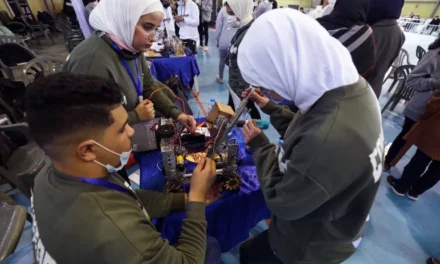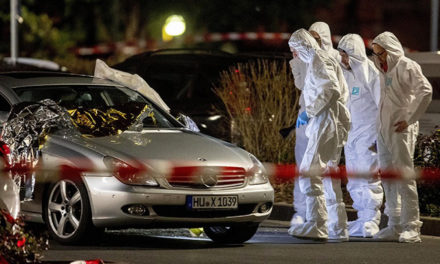A Sudanese rebel fighter from the Justice and Equality Movement (JEM) sombrely watches the abandoned
On December 9, 2023, the U.N. Convention on the Prevention and Punishment of the Crime of Genocide (the Genocide Convention) will mark its 75th anniversary. The Genocide Convention can be praised for being the first international treaty to define genocide, providing a historic commitment to prevent genocide and punish the perpetrators. However, the existence of the Genocide Convention itself and states ratifying it – mean little if its implementation does not follow. The effectiveness of the Genocide Convention depends on state parties giving effect to their obligations – translating their commitments into action. While the aspirational pledges to prevent and punish have underpinned international criminal developments, these do not necessarily translate into effective enforcement.
The last 75 years have seen too many cases of genocide. In the last decade, there have been several genocides or situations at serious risk of genocide that require attention here – genocides that we all have lived through, even if far from our homes.
In 2014, Daesh attacked Sinjar in Iraq and unleashed genocide against the Yazidi numeric minority community. Daesh perpetrated a litany of atrocities, including murder, enslavement, deportation and forcible transfer of populations, imprisonment, torture, abduction of women and children, exploitation, abuse, rape, and sexual violence. Daesh fighters killed hundreds if not thousands of people. As part of the same campaign, Daesh fighters abducted boys to turn them into child soldiers and women and girls for sex slavery. Subsequently, Daesh attacked Nineveh Plains forcing over 120,000 Christians to flee for their lives. More than 2,700 Yazidi women and children are still missing and their fate is unknown – as such, this genocide is considered as ongoing.
In 2020, with the outbreak of the war in Ethiopia, news reported on the targeting of Tigrayans with mass killings and brutal cases of rape and sexual violence. As the ceasefire was being signed in November 2022, the legacy of the war includes an estimated 600,000 – 800,000 people killed (making it the deadliest war in recent years), over 120,000 people subjected to conflict-related sexual violence, over a million people internally displaced within Tigray and over 60,000 fleeing to Sudan, thousands of people dead due to starvation. Despite the ceasefire in November 2022, the situation of the communities is still dire.
In 2021, as the Taliban was taking over, the Hazara, an ethnic but also a religious numeric minority group, became a target yet again. Hazara places of worship, schools and hospitals came under attack with countless causalities. There are continuous and increasing threats against the Hazara that include targeted kidnapping and arrest of Hazara leaders, scholars, and military members and their family members across Afghanistan. The Hazara Inquiry, a U.K. Parliamentary inquiry, found that Hazara in Afghanistan, as a religious and ethnic minority, are at serious risk of genocide at the hands of the Taliban and Islamic State–Khorasan Province (IS-K).
In 2022, Russia attacked Ukraine and unleashed a litany of crimes including atrocities aiming at the destruction of the Ukrainian identity. Among such crimes are the abductions of children, and forced transfer to Russia to subject them to illegal adoptions by Russian families. According to the testimonies of rescued children, once removed from their families or guardians, they were prohibited from speaking Ukrainian, and forced to learn and speak Russian. In 2023, the practice of removing Ukrainian children received some focus from the International Criminal Court (ICC). Indeed, in March 2023, the Pre-Trial Chamber II of the ICC issued warrants of arrest for two individuals in the context of the situation in Ukraine: Mr Vladimir Vladimirovich Putin and Ms Maria Alekseyevna Lvova-Belova and this for the war crime of unlawful deportation of population (children) and that of unlawful transfer of population (children) from occupied areas of Ukraine to the Russian Federation (under articles 8(2)(a)(vii) and 8(2)(b)(viii) of the Rome Statute). However, as for now, the ICC does not consider the crime as part of the genocide against Ukrainians.
In 2023, Darfur was issued a warning of the risk of imminent genocidal mass killing as the Rapid Support Forces (RSF), the paramilitary group in conflict with the Sudanese Armed Forces (SAF), was on the verge of taking over the entire Darfur region after capturing four of its five states. The warning issued by over 70 international law experts stated that the evidence of persecution and killings based on ethnicity is well-established. As they indicated, “In recent weeks, the RSF has become increasingly brazen in its attacks and brutality against civilians, particularly targeting the Masalit ethnic group directly. Earlier this month, in just six days, RSF forces terrorized an IDP camp in Ardamata, a site thought to be a place of refuge from prior attacks, massacring hundreds and enslaving members of the Masalit. This follows the RSF unleashing the same horrors on El Geneina earlier this year, leaving hastily dug mass graves for members of the Masalit community. According to survivors of these massacres, the RSF and its militiamen singled out Masalit for execution and further hunted down prominent leaders of the community.”
These are the cases from the last ten years where the elements of the crime of genocide are established or, at minimum, there is a serious risk of genocide. These findings should engage the responsibility of all States to protect the targeted communities and prevent genocide, under the Genocide Convention and customary international law. Unfortunately, the responses to these situations have been neglectful, and unworthy of the promise of “Never Again” repeated by leaders again and again.
One may argue that we, as the international community, use the word “genocide” too lightly. However, the growing evidence in these cases suggests otherwise. Also, the fact that some cases are not formally recognized as genocide does not change the reality on the ground but only plays into the denialism that accompanies the crime. We must be braver to recognize atrocity crimes for what they are. We must be braver to act in accordance with the duties the Genocide Convention placed upon us all 75 years ago. This is the only way to challenge the legacy of the failed responses we have seen too often over the years. This is the only way to protect whole communities from attacks that target their identity.














